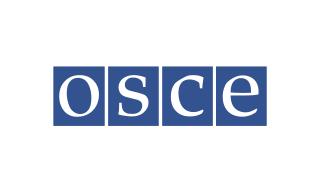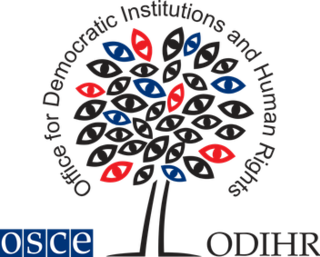
The Organization for Security and Co-operation in Europe (OSCE) is a regional security-oriented intergovernmental organization comprising member states in Europe, North America, and Asia. Its mandate includes issues such as arms control, the promotion of human rights, freedom of the press, and free and fair elections. It employs around 3,460 people, mostly in its field operations but also in its secretariat in Vienna, Austria, and its institutions. It has observer status at the United Nations.

La Strada International (LSI) is an international NGO network addressing the trafficking of persons in Europe.

Lívia Járóka is a Hungarian politician. She is a Member of the European Parliament, first elected as part of the Fidesz list in 2004. Járóka is the second Romani ever elected to the European Parliament.

Election monitoring involves the observation of an election by one or more independent parties, typically from another country or from a non-governmental organization (NGO). The monitoring parties aim primarily to assess the conduct of an election process on the basis of national legislation and of international election standards. There are national and international election observers.

The Decade of Roma Inclusion was an initiative of 12 European countries to improve the socio-economic status and social inclusion of the Romani people across the region. The initiative was launched in 2005, with the project running from 2005 to 2015, and was the first multinational project in Europe to actively enhance the lives of Roma.

UNITED for Intercultural Action is a European network against nationalism, racism, fascism and in support of migrants and refugees, in which over 560 organisations from 48 European countries cooperate. UNITED was founded in 1992 and provides a forum for active solidarity and cooperation between a wide variety of organisations in Europe and their activists across European borders.

Thomas Hammarberg is a Swedish diplomat and human rights defender.

The office of the OSCE High Commissioner on National Minorities (HCNM) is charged with identifying and seeking early resolution of ethnic tension that might endanger peace, stability or friendly relations between and within the participating states of the Organization for Security and Co-operation in Europe.
Human rights education (HRE) is the learning process that seeks to build knowledge, values, and proficiency in the rights that each person is entitled to. This education teaches students to examine their own experiences from a point of view that enables them to integrate these concepts into their values. Decision-making, and daily situations. According to Amnesty International, HRE is a way to empower people is by training them so that their skills and behaviors promote dignity and equality within their communities, societies, and throughout the world.
The Fighting Discrimination Program of Human Rights First focuses on the violence known as hate crimes or bias crimes. Because equality is a cornerstone of human rights protection, discrimination in all its forms is a violation of human rights. Discrimination can take the form of violence generated by prejudice and hatred founded upon a person's race, ethnicity, religious belief, sexual orientation, gender, disability, age or other such factors. Through the Fighting Discrimination Program, Human Rights First seeks to combat discrimination by reversing the tide of antisemitic, anti-immigrant, and anti-Muslim violence and reducing other bias crime in North America, Europe, and the Russian Federation.

The Office for Democratic Institutions and Human Rights (ODIHR) is the principal institution of the Organization for Security and Cooperation in Europe (OSCE) dealing with the "human dimension" of security. The Office, originally established in 1991 under the 1990 Paris Charter as the Office for Free Elections, is still best known for its role in observing elections although its name changed in 1992 to reflect the broadening of its role by the Helsinki Summit.

The Documentation and Cultural Centre of German Sinti and Roma was established in Heidelberg, Germany, in the early 1990s, as a memorial to Sinti and Roma people who were killed by the National Socialists Party. After several years of extension work collecting stories from the victims, conducting research, and conversion, the building complex was ceremonially opened to the public on 16 March 1997, and was supported by the attendance of many Roma and Sinti survivors. It is the world's first permanent exhibition on the genocide perpetrated upon the Sinti and Roma by the Nazis. The documentation Centre has three levels and covers an area of almost 700 square meters, and traces the history and stories of the persecution of the Sinti and Roma under National Socialism. The institution is overseen by Central Council of German Sinti and Roma, supported by the city of Heidelberg, and is the beneficiary of special funds from the German Federal Government and the land of Baden-Württemberg.

Presidential elections were held in Azerbaijan on 9 October 2013. The result was a victory for incumbent President Ilham Aliyev, who received a reported 85% of the vote, whilst leading opposition candidate Jamil Hasanli finished second with a reported 6% of the vote.
The European Union is committed to upholding Human Rights and sees this as a core and essential part of its role. As such the EU seeks to protect and defend these rights within member states and in interactions with non-members.
The European Network of National Human Rights Institutions (ENNHRI) is a membership international not-for-profit association (AISBL) under Belgian law. In 2013 it established its Permanent Secretariat in Brussels bringing together National Human Rights Institutions (NHRIs) from across the wider European region. Formerly known as European Group of National Human Rights Institutions, ENNHRI has been actively working in the field of promotion and protection of human rights in wider Europe for 15 years. ENNHRI essentially assists in the establishment and accreditation of European NHRIs, coordinates the exchange of information and best practices among its members, facilitates capacity building and training, engages with international and regional mechanisms for protection and promotion of human right and intervenes on legal and policy developments in Europe.

The OSCE Special Monitoring Mission to Ukraine was an international civilian observer mission of the Organization for Security and Cooperation in Europe (OSCE) mandated to contribute to reducing tensions and to help foster peace in Ukraine. The mission was deployed in March 2014, following the Russian annexation of Crimea and the outbreak of open conflict in eastern Ukraine. The mission ended on 31 March 2022, following the Russian invasion of Ukraine.

Matteo Mecacci is an Italian diplomat. From December 2020 to August 2024 served as director of the OSCE's Office for Democratic Institutions and Human Rights (ODHIR). In the past, he was a Radical Party Member of Parliament in Italy and elected in the lists of the Democratic Party, President of the International Campaign for Tibet and leading advocate for the International Criminal Court, the abolition of the death penalty, religious freedom and other prominent human rights campaigns.
Katarzyna Gardapkhadze - current CEO of the Responsible Leadership Academy and a former First Deputy Director of the OSCE's Office for Democratic Institutions and Human Rights (ODHIR), in the post from September 2016 until 30 June 2021. In 2020, during a period without a politically appointed Director, she served as ODIHR's Director's Alternate.
The Vienna Mechanism and the Moscow Mechanism are a linked pair of agreements on confidence and security-building measures on human rights established in 1989, 1990 and 1991 by the members states of the Conference on Security and Co-operation in Europe (CSCE), which later became the Organization for Security and Co-operation in Europe (OSCE). The Vienna Mechanism establishes procedures for raising and responding to participating states' requests on human rights issues, while the Moscow Mechanism adds procedures for independent "missions of experts" and "missions of rapporteurs" to visit and report on human rights issues.
Tatiana Kotlyarenko is an international expert in human rights, human trafficking and addressing gender-based violence. Her career has been marked by extensive work in policy development, advocacy, and international cooperation to combat human trafficking and promote human rights, including her service as the Adviser on Anti-Trafficking Issues at the Office for Democratic Institutions and Human Rights (ODIHR) of the Organization for Security and Co-operation in Europe (OSCE).













